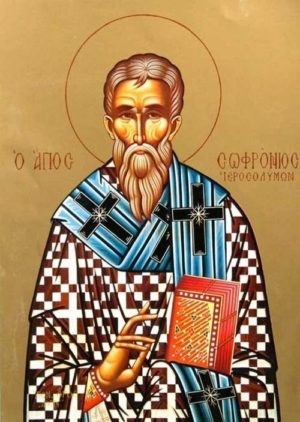– Anastasios
Our Sophronius (560-638) was born in Damascus and entered the monastery of Saint Theodosius in Jerusalem. He traveled frequently in Asia and in Rome. He was consecrated Patriarch of Jerusalem. During his life one of his most fierce fights was against monothelitism: “Monothelite, any of the 7th-century Christians who, while otherwise orthodox, maintained that Christ had only one will. The Monothelites were attempting to resolve the question of the unity of Christ’s person on the basis of the firmly established doctrine of the two natures, divine and human, in the person of Christ. The controversy originated in the attempts by the Byzantine emperor Heraclius to win back for the church and empire the excommunicated and persecuted Monophysites of Egypt and Syria.
In Armenia in 622, Heraclius first suggested to the head of the Severian Monophysites that the divine and human natures in Christ, while quite distinct in his one person, had but one will (thelēma) and one operation (energeia). Sergius, patriarch of Constantinople, was a strong upholder of the doctrine and was the emperor’s adviser on the question. In 638 Heraclius issued the Ekthesis (“Statement of Faith”), which formulated the position. This led to such intense controversy that Heraclius’ successor, Constans II, issued an edict in 648 forbidding all discussion of the question. This secured silence, despite the protest of the Western church at the Lateran Council of 649.” (britannica.com).
About him thus has said the Catholic New Agency: “Chosen to lead the Church in Jerusalem during 634, Sophronius continued to oppose the monothelite heresy. But he soon faced a more tangible threat from Caliph Umar and his army of followers. The Muslims besieged Jerusalem for two years during Sophronius’ patriarchate, forcibly depriving the city’s residents of food. The patriarch could only save the lives of his people by negotiating a surrender with the caliph. Thus, Jerusalem fell to Islam for the first time in 637. Heartbroken, St Sophronius died the following year. Patriarch St Sophronius’ stand against monothelitism was vindicated near the end of the seventh century, when the heresy of “one will” in Christ received formal condemnation at the Sixth Ecumenical Council in Constantinople. But the Jerusalem Patriarchate remained vacant for many decades after St Sophronius’ death: a successor was not appointed until 705. Jerusalem, meanwhile, would not pass back into Christian hands until the First Crusade of 1099.”
Sophronius was also known, as we have seen, for his relationship with Islam (“the Saracens”). This is a passage from him about Islam: “But the present circumstances are forcing me to think differently about our way of life, for why are [so many] wars being fought among us? Why do barbarian raids abound? Why are the troops of the Saracens attacking us? Why has there been so much destruction and plunder? Why are there incessant outpourings of human blood? Why are the birds of the sky devouring human bodies? Why have churches been pulled down? Why is the cross mocked? Why is Christ, who is the dispenser of all good things and the provider of this joyousness of ours, blasphemed by pagan mouths (ethnikois tois stomasi) so that he justly cries out to us: ‘Because of you my name is blasphemed among the pagans,’ and this is the worst of all the terrible things that are happening to us. That is why the vengeful and God-hating Saracens, the abomination of desolation clearly foretold to us by the prophets, overrun the places which are not allowed to them, plunder cities, devastate fields, burn down villages, set on fire the holy churches, overturn the sacred monasteries, oppose the Byzantine armies arrayed against them, and in fighting raise up the trophies [of war] and add victory to victory. Moreover, they are raised up more and more against us and increase their blasphemy of Christ and the church, and utter wicked blasphemies against God. Those God-fighters boast of prevailing over all, assiduously and unrestrainably imitating their leader, who is the devil, and emulating his vanity because of which he has been expelled from heaven and been assigned to the gloomy shades. Yet these vile ones would not have accomplished this nor seized such a degree of power as to do and utter lawlessly all these things, unless we had first insulted the gift [of baptism] and first defiled the purification, and in this way grieved Christ, the giver of gifts, and prompted him to be angry with us, good though he is and though he takes no pleasure in evil, being the fount of kindness and not wishing to behold the ruin and destruction of men. We are ourselves, in truth, responsible for all these things and no word will be found for our defence. What word or place will be given us for our defence when we have taken all these gifts from him, befouled them and defiled everything with our vile actions?” (Holy Baptism, 166-167 [pp. 72-73]).
The relationship with Islam is still today a hot topic. We have seen that after so many centuries, we are still struggling to find the right way of mutual respect and understanding.


 Follow
Follow


